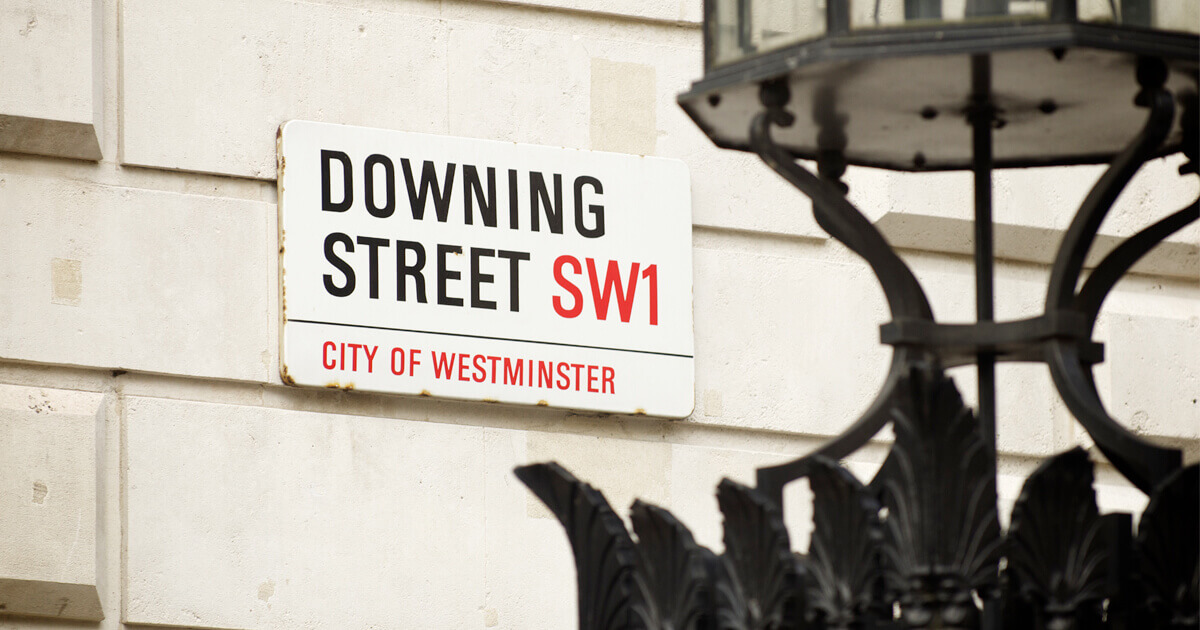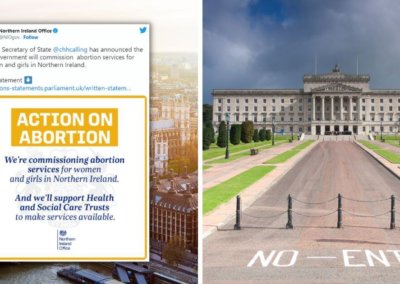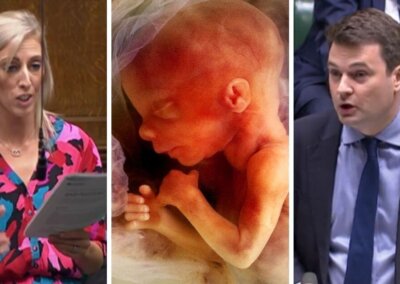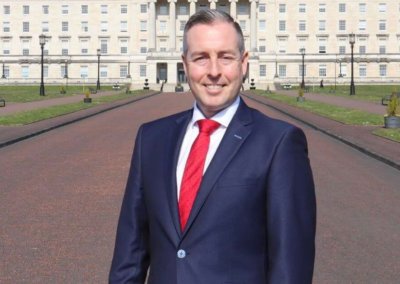The Government’s approach to imposing abortion on Northern Ireland has been criticised by a highly influential House of Lords Committee.
The Secondary Legislation Scrutiny Committee, which scrutinises legislation parliament has granted the Government power to introduce, has released a report highlighting a number of concerns with the new regulations.
Chief among the Committee’s concerns was how the Government handled a public consultation on the extreme abortion regime before it came into force.
The report states that the six-week consultation period was “too short for so sensitive a topic”, adding that it “took place during the General Election period and in the run up to Christmas – neither of which conforms with best practice”.
Moreover, the Committee found fault with the Government’s decision to impose such controversial regulations on Northern Ireland amidst the coronavirus crisis and just as Parliament was going into a period of recess.
The consequence of the Government laying out regulations so close to 31 March deadline and before a parliamentary recess denied Parliament a crucial opportunity to scrutinise the regulations before they came into effect.
Overwhelming opposition
The report also makes reference to the overwhelming level of opposition to the extreme abortion legislation from across the community in Northern Ireland including disability groups, MPs, MLAs, charities and the Attorney General of Northern Ireland.
79% of respondents to the Northern Ireland Office’s consultation were opposed to any change in Northern Ireland’s abortion.
Additionally, the majority of submissions received directly by the Committee were critical of the regulations.
Lack of conscience and disability protections
In his submission to the Committee, the Attorney General John Larkin QC criticised disability provisions in the regulation which allow for abortions for disabilities including cleft lip, club foot and Down’s syndrome right up to birth.
The lawyer also noted the lack of conscientious protections in the legislation which could mean healthcare professionals could be forced to participate in abortion procedures or face losing their jobs.
Mr Larkin wrote: “In my view, it is disproportionate in the Northern Irish context (and therefore contrary to article 9 of the Convention) to require those who undertake ancillary, administrative and managerial tasks to act contrary to their conscience…”.
Abuse of power
Right To Life UK also raised a number of problems with the regulations, showing how “the UK Government went far beyond what they were legally required to when laying these regulations, despite the restoration of the Northern Ireland Executive in January”.
Northern Ireland MP Carla Lockhart echoed those concerns, in her submission, saying:
“As one who represents Northern Ireland, I also would like to address what appears to be a politically unusual use of power, which is that even though the Northern Ireland Assembly was restored in the period between the law passing (that required an expansion of abortion services) and the regulations needing to be laid, the Government went ahead to implement regulations that go beyond what they were required to do rather than limiting the regulations to the minimum requirements of the law…”
No abortion alternatives offered
Pro-life MP Fiona Bruce drew attention to the lack of practical support, social and financial, being offered to women who want to keep their babies when facing a crisis pregnancy.
In a further point, she said the failure to introduce an offence of coercive abortion puts the Government at risk of failing to comply with international law.
“It would naturally be contrary to the purpose of the instrument in question to see
Northern Ireland in contravention of international law,” she notes.
The Government has claimed it needed to impose abortion regulations on Northern Ireland in the absence of a sitting Northern Ireland Executive.
Article 39 of the Istanbul Convention sets out the following: “Parties shall take the necessary legislative or other measures to ensure that the following intentional conducts are criminalised: (a) performing an abortion on a woman without her prior and informed consent; (b) performing surgery which has the purpose or effect of terminating a woman’s capacity to naturally reproduce without her prior and informed consent or understanding of the procedure.”
New extreme regulations discriminate
Don’t Screen Us Out, a disability advocacy group, note how the extreme regulations not only go far beyond what is legally required by the Government but would amend existing legislation in Northern Ireland and “make it legal to end the life of an unborn baby post 28 weeks’ gestation if carried out by a medical professional”.
Combined with other regulations, the change in law will allow discriminatory disability-selective abortion following any disability diagnosis. Including cleft lip, club foot and Down’s syndrome.
Lord David Alton revealed how the extreme regime imposed on Northern Ireland, which allows for abortion on-demand up to 12-weeks, will allow for sex-selective abortion – the termination of a baby simply based on its sex.
The lifelong human rights campaigner and pro-life advocate said: “It is deeply troubling that Ministers should have signed off regulations which plainly open the door to sex selection [abortion] since the law does not require anyone asking for an abortion to give any reason at all, which means permitting abortion for any reason, including sex selection.”
He adds: “The Regulations’ failings must be of huge concern because NIPT testing – which is available in Northern Ireland – means it is possible to determine the sex of the fetus from 10 weeks and will soon be possible to determine the sex of the fetus from just 7 weeks.”
The Committee has raised these concerns ahead of the regulations being voted by MPs and Peers before 17 May 2020.
A spokesperson for Right to Life UK, Catherine Robinson said:
“These regulations legalise sex-selective abortion and introduce abortion for babies with disabilities including cleft lip, club foot and Down’s syndrome to birth. They introduce defacto abortion-on-demand to Northern Ireland through to 24-weeks.
“They also open up abortion provision to midwives and nurses. This goes much further than the law In England and Wales, where abortions can only be performed by a doctor and the Abortion Act requires the approval of two doctors before an abortion can be performed.
“The influential Committee has chosen to draw these regulations to the special attention of the House. The Committee has reported on a number of serious issues with the regulations.
“MPs and Peers at Westminster must take on board these problems and vote against the regulations when they are brought before Parliament.”












